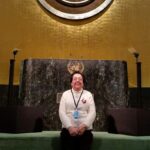
Vladimir Putin’s infliction of a second Iron Curtain on the Russian people demonstrates anew the critical importance of freedom of the press in maintaining governmental accountability.
Putin’s nationwide censorship of any news reports that contradict his false claims of “de-nazifying” Ukraine, enforced by a brutal 15-year prison sentence for violators, has plunged most Russians into a state of darkness and ignorance. Most know very little about the horrific, unprovoked war that he has launched against Ukraine and the atrocities perpetrated against civilians that constitute war crimes, by any measure.
Such is life in a totalitarian nation, in which freedom of the press is beyond comprehension. Some Russians, with access to private internet networks, are aware of Putin’s horrors and engaged in demonstrations against the dictator. Some 8,000 courageous protesters have been imprisoned, leaving them to face an uncertain future.
Suppose circumstances were otherwise. Suppose an Iron Curtain had not been imposed. Suppose Putin did not execute journalists whom he denounces as enemies of the state. Suppose Russians were, in fact, informed by professionally trained journalists who report from the front lines about the conduct of the war — its origins, causes, costs, casualties and tragedies. Armed with knowledge about the war, the Russian people might rise in opposition and bring it to an end.
Putin’s censorship, however, chokes the pipeline of information and knowledge and, with it, the emergence of nationwide protests capable of ending the catastrophe. His war on the press represents a stark lesson for Americans who take freedom of the press for granted.
Freedom of the press, we should recall, serves vital functions in a democracy. It promotes individual fulfillment, knowledge and understanding of the issues of the day. It is critically linked to self-government, social change and the exchange of ideas. A free press, in its historic role as “the fourth estate,” performs the crucial function of checking government and holding it accountable to both the law and the American people. In addition, a free press is capable of confronting powerful institutions and organizations and other centers of authority.
Justice Hugo Black, a champion of freedom of the press, wrote in his magisterial opinion in The Pentagon Papers Case: “In the First Amendment the Founding Fathers gave the free press the protection it must have to fulfill its essential role in our democracy. The press was to serve the governed, not the governors. The Government’s power to censor the press was abolished so that the press would remain forever free to censure the Government. The press was protected so that it could bare the secrets of government and inform the people. Only a free and unrestrained press can effectively expose deception in government.”
Freedom of the press, alone, cannot prevent governmental errors of policy, laws and programs, any more than it can guarantee that an informed citizenry will act wisely and exhibit good judgment. Nor does freedom of the press guarantee that newspapers will be free of errors, but what profession — medicine, lawyering and business — is without flaws?
Freedom of the press supplies self-government with essential tools. No country that aspires to democracy, and no democracy that aspires to success, can accomplish such an end without freedom of the press. Shutter the press and the citizenry will live in ignorance and darkness, unable to hold governmental accountable.
For all those in recent years who have railed against the press as “the enemy of people” and delighted in undermining the Fourth Estate and assailing its reputation because it represents a hindrance to their own autocratic aims, it is important to understand that those attacks are cut from the same cloth as Putin’s attacks on independent news in Russia.
The line between democracy and authoritarianism is thin when the institutions created to defend the rule of law and the principles of liberty and justice are brought low. The line, we might say, begins and ends with an informed citizenry determined to defend democratic values, principles, institutions and freedoms.
Adler, Ph.D., is President of The Alturas Institute, created to defend American democracy by advancing the Constitution, civic education, equal protection and gender equality.




